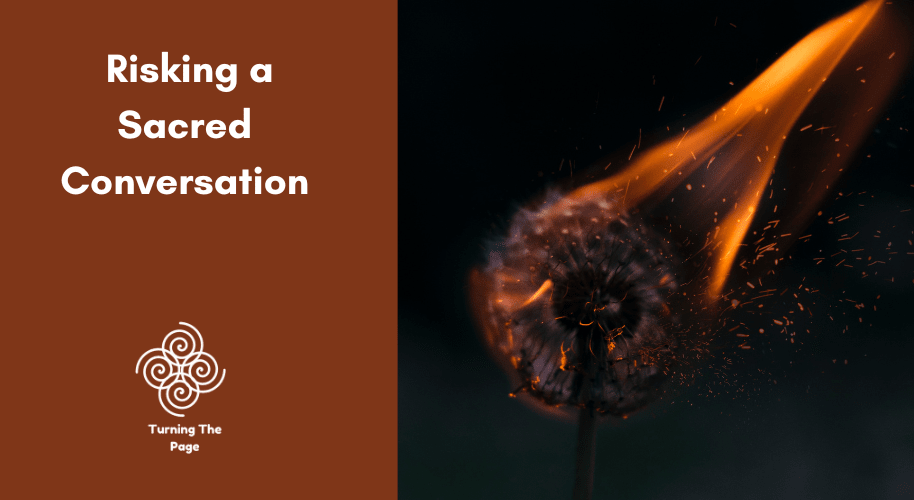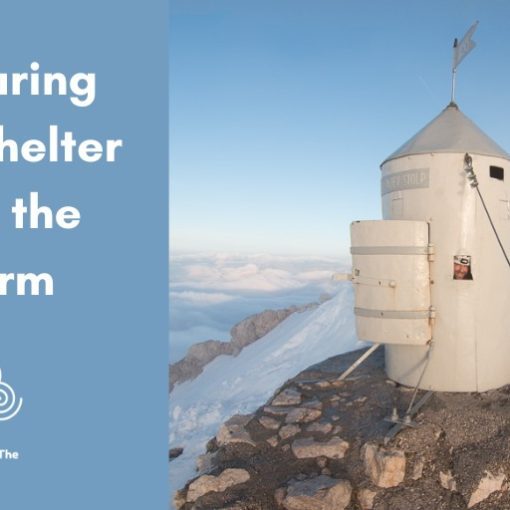We all want to be known, held and loved, but to find this requires a level of risk to have a sacred conversation. Are you ready for that?
I once had a conversation with someone, what I would call a sacred conversation, and they couldn’t handle the fire.
They couldn’t handle the heat of what I shared. I could hardly handle it myself, and I was hoping they could help.
But they were too caught up in rules, regulations, and fire extinguishers.
Not everyone can handle the fire. Not everyone has hands that can hold molten lava words. Some can, most can’t, and that’s actually ok.
But for some of the deep burning coals that we carry in our lives, we need someone who will risk coming near our fire. Some conversations are sacred moments where angels hold their breath to see what will proceed.
These sacred conversations are always risky.
So risky that you won’t be able to come near them without the divestment of footwear.
A Sacred Conversation
God takes a risk.
It goes something like this.
Can I ask a man to risk it all and go on a mission for me? It’s a mission where he will have to go up against the most powerful ruler of the known world – Pharoah of Egypt.
I think I can risk it with him. He will have to trust me all the way, and he may well fail, but I’m going to risk it. This is part of the larger story I’m playing out.
Let’s have a conversation and see if he agrees.
Moses was shepherding the flock of Jethro, his father-in-law, the priest of Midian.
He led the flock to the west end of the wilderness and came to the mountain of God, Horeb.
The angel of God appeared to him in flames of fire blazing out of the middle of a bush. He looked.
The bush was blazing away, but it didn’t burn up.
Moses said, “What’s going on here? I can’t believe this! Amazing! Why doesn’t the bush burn up?”
God saw that he had stopped to look. God called to him from out of the bush, “Moses! Moses!”
He said, “Yes? I’m right here!”
God said, “Don’t come any closer. Remove your sandals from your feet. You’re standing on holy ground.”
Then he said, “I am the God of your father: The God of Abraham, the God of Isaac, the God of Jacob.”
Moses hid his face, afraid to look at God. Exodus 3:1-6
Holy Ground
Some conversations are sacred.
The conversation has never happened before with anyone. It’s gone to a new level of risk.
There is a disclosure of something so precious you want nothing man-made to get in the way.
God says to Moses to take off his sandles. Nothing fashioned by a man must come between them.
Moses’ toes need to feel the dust from which he was formed from.
Holy ground needs earthy awareness.
It’s a risk to take off your sandles. Those leather self crafted protectors provide a barrier, a skin, an impervious layer to separate us from the earth.
One of the first qualities that I have noticed about people who are on a journey towards both good mental health and a healthy faith is that they have what I would call a grounded reality.
They are connected to the here and now. They don’t use spiritual bypasses and they don’t live according to harsh rules and regulations. There is balance, lightness, and freedom. But it’s this groundedness into the here and now that I look for and hopefully help people find.
This post was going to be about listening to lament, but it grew into listening to sacred conversations. A good lament doesn’t run from or minimise pain. It’s the grounded reality of living in the here and now. Lament is a sacred conversation.
The risk of a gift
It’s a gift when others let you into their world. A precious gift that I consider sacred.
It’s a stepping on holy ground, knowing that if the conversation is going to make a difference, then you’re probably going to be wrecked in someway.
One of my favourite quotes is this.
True conversation always puts the conversant’s at risk, because you cannot truly converse without the risk of conversion. Bernard Lee; Michael Cowan
Its whisper floated through my brain as I started to write this post.
It’s risky business having conversations of any worth.
The risk of conversion. That there is a willingness to surrender firmly held views, opinions and judgments to embrace something new.
I think of the sacred conversation between the angel Gabriel and Mary
In the sixth month of Elizabeth’s pregnancy, God sent the angel Gabriel to Nazareth, a village in Galilee, to a virgin named Mary.
She was engaged to be married to a man named Joseph, a descendant of King David.
Gabriel appeared to her and said, “Greetings, favored woman! The Lord is with you!”
Confused and disturbed, Mary tried to think what the angel could mean. Luke 1:26-29
Confused and disturbed
Sacred conversations will more often than not leave us confused and disturbed. They make us think as to ‘what they might mean’.
Our world can be rattled, and all the nice neat boxes and categories of how life is supposed to work are shaken up and exposed as vulnerable.
Want a sacred conversation?
Not really. I would much rather have a life of small ambitions, conformity, staying in the boat, and stale boredom.
How to finish this?
A quote from C.S. Lewis
The main work of life is to come out of ourselves, out of the little, dark prison we are all born in. The danger is that of coming to love the prison. C.S. Lewis.
You may also like to listen to this podcast What Really Helps Trauma? with Dr. Jacob Ham
Quotes to consider
- Grief is neither a problem to be solved nor a problem to be overcome. It is a sacred expression of love … a sacred sorrow. Gerald May
- True conversation always puts conversants at risk, because you cannot truly converse without allowing for the possibility that your assumptions about life might be changed in the process. Put people together in genuine community where conversation allows them to participate in one another’s lives (koinonia), and throw the Christ-event in as a conversation partner (kerygma), and ekklesia is born. Church happens. Bernard J. Lee and Michael A. Cowan. Gathered and Sent: The Mission of Small Church Communities Today (p. 17). Paulist Press. Kindle Edition.
- Tell the students to give up their small ambitions and come eastward to preach the gospel of Christ.
- Authentic Christianity is not so much a belief system as a life-and-death system that shows us how to give away our life, how to give away our love, and eventually how to give away our death. Basically, how to give away—and in doing so, to connect with the world, with all other creatures, and with God. Richard Rohr
- Those who give their lives sacrificially, those willing to suffer with freedom and joy, are also those saving (however we may want to define that word) other people, liberating people more than anybody else. Richard Rohr -Job and the Mystery of Suffering
- Sacrifice comes from the words sacrum facere — to make sacred or holy. We make something holy by reconnecting it to the whole — in our case specifically by giving ourselves away to the other. Richard Rohr -Job and the Mystery of Suffering
- I don’t see how we can show anybody we love them if we do not sacrifice for them. Richard Rohr -Job and the Mystery of Suffering
- Sacrifice of oneself for the other is simply love in its later stages. It’s a very old-fashioned word. Richard Rohr -Job and the Mystery of Suffering
Questions to answer
- Have you ever had what you would consider a ‘sacred conversation’? What happened in you because of it?
- Why can’t some people handle the fire of another’s struggle?
- Jesus called Peter to walk on water. It was a sacred conversation. Where are you in the boat? What feelings bubble up as you watch the conversation?
Formation Exercise
- Listen deeply to someone. Be gently curious about the activity of their soul. What is the risk level in this conversation? Take a millimetre risk movement in listening deeper.
Further reading
Barry Pearman
Photo by Andrew Tanglao on Unsplash






